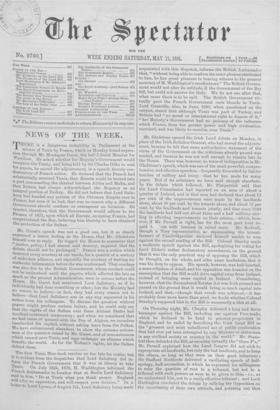Mr. Guest's speech was not a good one, but it
so clearly expressed a latent feeling in the House, that Mr. Gladstone himself rose to reply. He begged the House to remember that "justice, policy, T had almost said decency, reqnired that the debate should not be prolonged." France was a nation which 'deserved every courtesy at our hands, for a quarter of a century 'of unbroken alliance, and especially the courtesy of waiting for authentic information before she was condemned. That courtesy 'was also duo to the British Government, whose conduct could not be understood until the papers, which affected the late as much as the present Administration, were in CXiC7180 before the House. Mr. Guest had mentioned Lord Salisbury, as if he individually had done something or other ; but the Ministry had no reason to believe—in fact, they had every reason not to believe—that Lord Salisbury was iu any way separated in his .action from his colleagues. To discuss the question without papers might produce serious injury, and he could only say that the rights of the Sultan over these African States had involved continued controversy ; and when we considered that 'we had cause of quarrel with the Day of Algiers, we ourselves bombarded his capital, without asking leave from the Sultan. We have endeavoured elsewhere to show the extreme serious- ness of the question raised by Mr. Guest, and of remonstrances which cannot save Tunis, and may endanger an alliance which benefits the world. As for the t ultan's rights, let the Sultan -defend them.


































